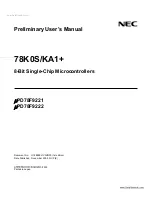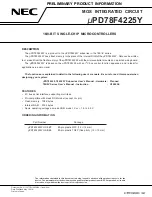
Page 26
The table below shows the pin assignments of the USB 2.0 PHY to the 7Z045
Table 13
– USB 2.0 Pin Assignments
When operating in host mode, the Zynq Mini-Module must supply 5 V to the endpoint devices.
The Zynq Mini-Module Plus does not have a 5 V power source that is supplied from the
baseboard. To accommodate this requirement the Zynq Mini-Module implements a highly
efficient TI TPS61027 synchronous boost converter. The TPS61027 has the ability to source
up to 1.5A at 3.3 V for the VBUS voltage rail at the USB connector J3.
2.6
Real-Time Clock (RTC)
The Zynq 7Z045 Mini-Module Plus Development Board has a real-time clock circuit that can be
accessed via the I
2
C interface. The
Maxim DS1337
device is used for this purpose. The DS1337
can count seconds, minutes, hours, days, date, month and year with leap year compensation up to
the year 2100.
The table below show the I
2
C signals and their connection to the 7Z045.
Net Name
7Z045 PIN #
I
2
C_SDA
F19
I
2
C_SCL
A19
Table 14
– RTC Pin Assignments
2.7
Power-on Reset
The Zynq 7Z045 Mini-Module Plus Development Board utilizes a power-on reset IC and circuit to insure
the 7Z045 PS_POR# and PS_SRST# signals de-assert in the correct sequence at power-up. To
accomplish this, the
Maxim MAX16025TE
device is used and is referenced on the board as “U8”. As
shipped, the delay sequence is programmed to release the PS_SRST# signal before the PS_POR#
signal. The delay for PS_POR# Is adjustable and set by C66, which as shipped is a 3300pf capacitor.
Please also note that the PS_POR# signal also gates the reset signal of the Ethernet and USB 2.0
PHY devices.
The power-on reset circuit also allows for the reset outputs of the MAX16025TE device to be
controlled manually by way of two push button switches. SW1 when depressed will assert the
PS_POR# signal which will completely reset the processor and all of the 7Z045 PS registers.
Depressing SW2 will assert the PS_SRST# signal which will send a soft reset to the 7Z045 PS
block. This reset signal will reset the processor but retain register data.
Both reset outputs can be asserted low together by placing a jumper on JP6 which is a master
reset for the MAX16025TE device.
Net Name
7Z045 Pin #
USB_D0
K17
USB_D1
G22
USB_D2
K18
USB_D3
G21
USB_D4
L17
USB_D5
B21
Net Name
7Z045 Pin #
USB_D6
A20
USB_D7
F18
USB_STP
L18
USB_NXT
H21
USB_DIR
H22
USB_CLK
H17
USB_RESET#
A18 or SW2











































